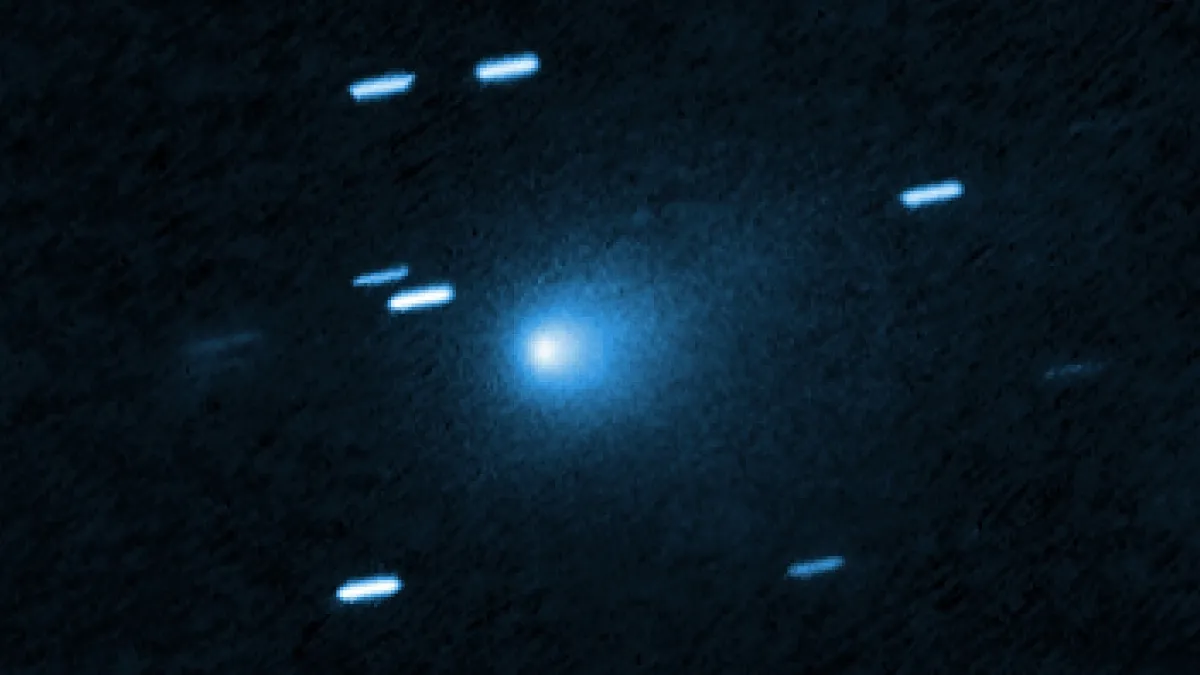
Comet 3I/ATLAS, recognized as only the third known celestial object to travel from beyond our Solar System, has been exhibiting an unexpected surge in brightness as it nears its perihelion, the closest point in its orbit to the Sun. Over the past month, this fascinating comet has been positioned almost directly behind the Sun from Earth's perspective, rendering ground-based observations nearly impossible during this critical phase. In response, astronomers have turned to space-based observatories for their chance to study this remarkable phenomenon.
An intriguing twist in the observation of Comet 3I/ATLAS comes from a unique group of observers: solar-monitoring satellites. Researchers Qicheng Zhang from Lowell Observatory and Karl Battams from the US Naval Research Laboratory discovered that spacecraft specifically designed to monitor the Sun’s corona could also effectively track the comet during its close approach to our star. Utilizing instruments aboard STEREO-A, SOHO, and GOES-19, they captured the comet's dramatic transformation over time.
The findings from these observations have been nothing short of astonishing. Between mid-September and late October, as 3I/ATLAS approached from approximately 2 astronomical units (AU)—equivalent to about twice the distance from the Earth to the Sun—to just 1.36 AU, its brightness surged significantly. The research team calculated that the comet's brightness increased proportionally to the inverse of its heliocentric distance raised to the 7.5 power. This steep brightening rate is notably higher than what was observed when the comet was farther out in the Solar System.
To put this rapid brightening into perspective, most comets typically exhibit a gradual increase in brightness as they approach the Sun, primarily due to the sublimation of ice into gas. However, Comet 3I/ATLAS is brightening at nearly twice the usual rate, hinting at some unusual activity on its surface. Additionally, observations indicate that the comet appears distinctly bluer than sunlight, a significant indication that gases—rather than merely dust—are playing a substantial role in its visible brightness. Earlier studies had indicated that the comet's dust was reddish, making this blue shift particularly noteworthy.
Researchers suspect that emissions from molecules such as cyanogen and possibly ammonia could be responsible for this unusual coloration. Images obtained from GOES-19's coronagraph depicted the comet as an extended object with a visible atmosphere, or coma, stretching approximately four arc-minutes across the sky. This glowing envelope of gas and dust surrounding the comet's nucleus confirms that 3I/ATLAS is actively shedding material as it experiences intensified solar heating.
On October 29, the comet reached its perihelion, with calculations suggesting it may have brightened to around magnitude 9, making it bright enough to be seen through smaller amateur telescopes. As Comet 3I/ATLAS emerges from behind the Sun, returning to darker skies in November and December, ground-based observers will finally have the opportunity to study this extraordinary interstellar wanderer in greater detail.
The underlying causes of this rapid brightening remain an open question. Researchers speculate that the comet's unusual behavior may be linked to its unique composition, its swift approach speed, or potentially distinctive characteristics acquired during its extensive journey through interstellar space. A preprint of the groundbreaking research is currently available on arXiv, inviting further exploration and discussion within the scientific community.